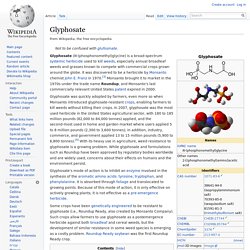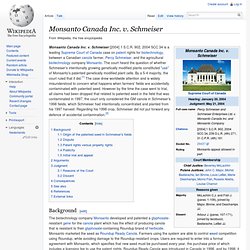

Leptin Part Of Porcine P1G. GENE FLOW IN COMMERCIAL FIELDS OF HERBICIDE-RESISTANT CANOLA (BRASSICA NAPUS) Roundup (herbicide) Glyphosate (N-(phosphonomethyl)glycine) is a broad-spectrum systemic herbicide used to kill weeds, especially annual broadleaf weeds and grasses known to compete with commercial crops grown around the globe.

It was discovered to be a herbicide by Monsanto chemist John E. Franz in 1970.[3] Monsanto brought it to market in the 1970s under the trade name Roundup, and Monsanto's last commercially relevant United States patent expired in 2000. Glyphosate was quickly adopted by farmers, even more so when Monsanto introduced glyphosate-resistant crops, enabling farmers to kill weeds without killing their crops. Glyphosate's mode of action is to inhibit an enzyme involved in the synthesis of the aromatic amino acids: tyrosine, tryptophan, and phenylalanine. It is absorbed through foliage and translocated to growing points. Some crops have been genetically engineered to be resistant to glyphosate (i.e., Roundup Ready, also created by Monsanto Company).
Discovery[edit] Chemistry[edit] Use[edit] Glyphosate tolerant canola GT73. FD/OFB-094-325-A October 1999 This content was archived on June 24 2013.

Archived Content Information identified as archived on the Web is for reference, research or recordkeeping purposes. It has not been altered or updated after the date of archiving. Web pages that are archived on the Web are not subject to the Government of Canada Web Standards. Help on accessing alternative formats, such as PDF, MP3 and WAV files, can be obtained in the alternate format help section. PDF Version Health Canada has notified Monsanto Canada Inc. that it has no objection to the food use of the transgenic canola line GT73, which has been developed to be tolerant to broad-spectrum glyphosate containing herbicides, specifically Roundup®. Background: The following provides a summary regarding the Monsanto Canada Inc. notification to Health Canada and contains no confidential business information. 1. 2. 3. 4. The human consumption of canola products is limited to the refined oil. Monsanto Canada Inc. v. Schmeiser. Monsanto Canada Inc. v.

Schmeiser [2004] 1 S.C.R. 902, 2004 SCC 34 is a leading Supreme Court of Canada case on patent rights for biotechnology, between a Canadian canola farmer, Percy Schmeiser, and the agricultural biotechnology company Monsanto. The court heard the question of whether Schmeiser's intentionally growing genetically modified plants constituted "use" of Monsanto's patented genetically modified plant cells. By a 5-4 majority, the court ruled that it did.[1] The case drew worldwide attention and is widely misunderstood to concern what happens when farmers' fields are accidentally contaminated with patented seed. However by the time the case went to trial, all claims had been dropped that related to patented seed in the field that was contaminated in 1997; the court only considered the GM canola in Schmeiser's 1998 fields, which Schmeiser had intentionally concentrated and planted from his 1997 harvest.
Background[edit] Dispute[edit] Publicity[edit]